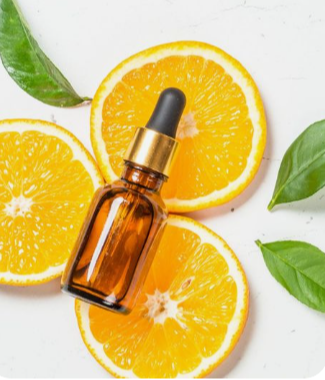
How to Treat Hyperpigmentation Naturally: Effective Remedies for Pigmentation on Face & Post-Inflammatory Hyperpigmentation
Hyperpigmentation or uneven skin tone, is a common skin condition that results in dark spots or patches. Whether you're dealing with pigmentation on your face from sun exposure, acne scars, or post-inflammatory hyperpigmentation (PIH), there are natural ways to help reduce the appearance of these dark spots and restore your skin's radiant glow.
What is Hyperpigmentation?
Hyperpigmentation is a widespread skin concern that affects individuals of all skin tones. It occurs when certain areas of the skin produce excess melanin, resulting in dark spots or uneven pigmentation. Whether triggered by acne scars, sun exposure, hormonal fluctuations, or skin injuries, this condition can often feel challenging to address.
Many people struggle with hyperpigmentation, which can manifest as stubborn discoloration on the face or other body parts. While it may seem difficult to treat, natural remedies especially those rooted in African traditions offer effective, gentle solutions. These time-tested methods promote healthier, radiant skin and honor nature's power in skincare.
Causes of Hyperpigmentation on the Face
Understanding the underlying causes of hyperpigmentation can help guide the right natural treatment methods. Common causes include:
-
Sun Exposure: UV rays can stimulate melanin production, leading to dark spots.
-
Post-Inflammatory Hyperpigmentation (PIH): This occurs when the skin heals after an injury, such as acne or a burn, leaving dark spots.
-
Hormonal Changes: Pregnancy, birth control, and menopause can contribute to pigmentation changes, often resulting in melasma.
Guide to Achieve a Brighter, Even Skin Tone Naturally
Step 1: Protect Your Skin with Sunscreen Daily

Sun exposure is one of the leading causes of hyperpigmentation. Protecting your skin with spectrum sunscreen (SPF 30 or higher) is essential to prevent existing dark spots from worsening and to prevent new ones from forming.
-
Tip: Look for mineral-based sunscreens with ingredients like zinc oxide or titanium dioxide for a natural option.
-
Bonus: Reapply sunscreen every 2-3 hours if you're outdoors for prolonged periods.
Step 2: Use Natural Exfoliants to Remove Dead Skin Cells
Gentle exfoliation helps fade dark spots by removing the top layer of dead skin cells and encouraging cell turnover. Natural exfoliants are a safer, non-irritating way to promote skin renewal.
-
DIY Scrub: Mix finely ground oats with honey for a mild exfoliator. Use this 1-2 times a week.
-
Other Options: Consider products with papaya enzymes, lactic acid (found in yogurt), or rice powder for gentle exfoliation.
Step 3: Apply Brightening Natural Ingredients
Incorporate natural treatments with skin-brightening properties into your skincare routine. Here are some effective remedies:
-
Aloe Vera Gel: Apply fresh aloe vera gel to dark spots daily. Aloe contains aloin, a natural depigmenting compound that helps lighten hyperpigmentation.
-
Turmeric Paste: Make a paste with turmeric and honey. Apply it to the affected areas for 10-15 minutes, then rinse. Turmeric is anti-inflammatory and helps reduce melanin production.
-
Licorice Extract: Add a few drops of licorice root extract to your moisturizer or toner to brighten dark spots and even skin tone.
Step 4: Incorporate Antioxidants Into Your Routine

Antioxidants help repair skin damage and reduce melanin production. Natural options include:
-
Vitamin C Serum: Look for serums with L-ascorbic acid, or apply a homemade mask using mashed strawberries or orange peel powder.
-
Green Tea: Brew green tea, allow it to cool, and use it as a toner or compress for areas with pigmentation.
Step 5: Stay Consistent with a Natural Nighttime Routine
Night-time is when your skin repairs itself. Use this time to target pigmentation with nourishing treatments:
-
Rosehip Oil: Apply a few drops of rosehip oil to your skin before bed to fade scars and improve texture.
-
Shea Butter or Cocoa Butter: These natural moisturizers deeply hydrate the skin, improving its ability to repair and regenerate.
Step 6: Eat a Skin-Healthy Diet

What you consume also impacts your skin. Foods rich in vitamins and antioxidants can promote a more even complexion.
-
Add These to Your Diet:
-
Vitamin C-rich foods like oranges, berries, and kiwis.
-
Leafy greens for their vitamin E and skin-nourishing properties.
-
Omega-3 fatty acids from sources like flaxseeds and walnuts reduce inflammation.
-
Stay Hydrated: Drink plenty of water to flush toxins and keep your skin hydrated from within.
Step 7: Be Patient and Consistent
Natural remedies take time to show results, but consistency is key. With a regular skincare routine and healthy habits, you’ll start to see improvements in the appearance of hyperpigmentation.
.
Treating hyperpigmentation naturally takes time, but with consistent care and the right remedies, you can significantly improve the appearance of dark spots and achieve a more even complexion. Whether it's pigmentation on your face due to sun exposure or post-inflammatory hyperpigmentation from acne, natural treatments can help restore your skin’s natural radiance.
African skincare traditions offer a wealth of natural remedies to treat hyperpigmentation, combining the wisdom of generations with the healing power of nature. You can achieve brighter, more even-toned skin while honoring these time-honored practices by incorporating ingredients like whipped body butter, baobab oil, black soap, and turmeric.
Are you ready to explore the benefits of African skincare for hyperpigmentation? Zawadi Naturals offers a range of products inspired by these traditions to help you on your journey to radiant, healthy skin. Visit Zawadi Naturals to explore their range today!


